Steviol Glycosides Market
Steviol Glycosides Market Size and Share Forecast Outlook 2025 to 2035
Steviol glycosides market is projected to grow from USD 5.6 billion in 2025 to USD 8.9 billion by 2035, at a CAGR of 4.7%. Stevioside will dominate with a 41.2% market share, while food will lead the end-use segment with a 46.1% share.
Steviol Glycosides Market Forecast and Outlook 2025 to 2035
The global steviol glycosides market is set to grow from USD 5.6 billion in 2025 to USD 8.9 billion by 2035, adding USD 3.3 billion in new revenue and advancing at a CAGR of 4.7%. Growth is driven by escalating demand for natural sugar alternatives, expanding clean-label food production infrastructure across consumer markets, and accelerating sugar reduction requirements among food and beverage organizations seeking healthier formulation solutions.
Steviol glycosides are increasingly recognized as essential ingredients for food formulation practitioners, offering precise sweetness delivery capabilities, calorie reduction assurance, and comprehensive natural sweetening characteristics compared to traditional artificial sweetener approaches. Stevioside formulations dominate the market, favored in food and beverage environments for their established natural properties, providing effective sugar replacement mechanisms, cost-efficient sweetening capabilities, and consumer acceptance across diverse application categories and product demographics.
Quick Stats for Steviol Glycosides Market
- Steviol Glycosides Market Value (2025): USD 5.6 billion
- Steviol Glycosides Market Forecast Value (2035): USD 8.9 billion
- Steviol Glycosides Market Forecast CAGR: 4.7%
- Leading Product in Steviol Glycosides Market: Stevioside (41.2%)
- Key Growth Regions in Steviol Glycosides Market: North America, Europe, and Asia Pacific
- Top Players in Steviol Glycosides Market: PureCircle (Ingredion), Cargill, Incorporated, Tate & Lyle, ADM, GLG Life Tech Corp.
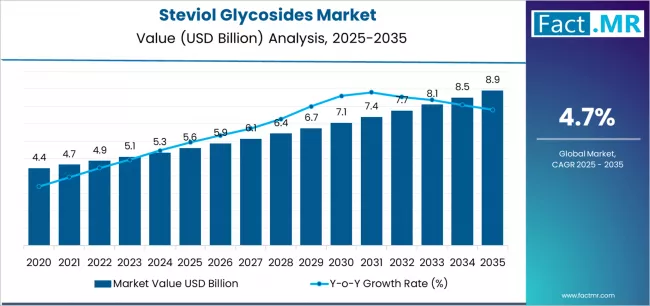
Stevioside remains fundamental in sugar reduction protocols where routine sweetening and calorie management match operational requirements and taste profile standards. Food applications are advancing among end-use categories as specialized product development networks expand and natural sweetener infrastructure increases accessibility in formulation-convenient locations with clean-label structures.
Geographic concentration demonstrates dynamic growth patterns with China and India leading expansion, supported by rising stevia cultivation capacity, natural sweetener consciousness expansion among consumer populations, and steviol glycosides production programs in agricultural centers.
USA, Germany, Japan, Brazil, and South Africa demonstrate robust development through established clean-label product ecosystems, regulatory framework maturity for natural sweeteners, and standardized acceptance of stevia-based formulation procedures. Competitive advantage is consolidating around taste profile optimization, purity level documentation, application versatility compatibility, and integrated sweetener portfolios rather than standalone steviol glycosides formulations alone.
The first half of the decade will witness the market climbing from USD 5.6 billion to approximately USD 7.2 billion, adding USD 1.6 billion in value, which constitutes 48% of the total forecast growth period. This phase will be characterized by the continued dominance of stevioside methodologies in food applications, combined with accelerating adoption of Rebaudioside A technologies in beverage formulations where taste profile enhancement and sugar reduction create favorable consumer acceptance outcomes.
The latter half will witness sustained expansion from USD 7.2 billion to USD 8.9 billion, representing an addition of USD 1.7 billion or 52% of the decade's growth, defined by broadening acceptance of advanced purification protocols and integration of specialty steviol glycosides across mainstream food and beverage manufacturing facilities.
Where revenue comes from - Now Vs Next (industry-level view)
| Period | Primary Revenue Buckets | Share | Notes |
|---|---|---|---|
| Today | Stevioside | 41.2% | Market dominance |
| Food | 46.1% | Primary application | |
| North America | 35.4% | Regional leader | |
| Rebaudioside A | 32.5% | Premium segment | |
| Beverage | 32.5% | Secondary application | |
| Future (3-5 yrs) | Rebaudioside M | 35-41% | Next-gen sweetener |
| Plant-Based Food Formulations | 38-44% | Clean-label growth | |
| Zero-Sugar Beverages | 42-48% | Health positioning | |
| Functional Foods | 32-38% | Wellness trends | |
| Protein Products | 28-34% | Taste masking | |
| Pharmaceutical Applications | 25-31% | Sugar-free medicines | |
| Emerging Market Adoption | 36-42% | Geographic expansion |
Steviol Glycosides Market Key Takeaways
At-a-Glance Metrics
| Metric | Value |
|---|---|
| Market Value (2025) → | USD 5.6 billion |
| Market Forecast (2035) ↑ | USD 8.9 billion |
| Growth Rate ★ | 4.7% CAGR |
| Leading Product → | Stevioside |
| Primary End-Use → | Food |
The market demonstrates exceptional fundamentals with Stevioside capturing a commanding 41.2% share through superior cost-effectiveness characteristics, established natural sourcing advantages, and proven sweetness profiles across food formulation applications. Food drives primary end-use demand at 46.1% share, supported by established clean-label infrastructure and sugar reduction requirements that maintain consumer acceptance across diverse product segments.
Geographic concentration remains anchored in North America and Europe with developed market leadership through natural sweetener adoption and steviol glycosides infrastructure development, while emerging markets show accelerated growth rates driven by health consciousness demographics and sugar reduction preferences.
Imperatives for Stakeholders in Steviol Glycosides Market
Design for taste and functionality, not just sweetness delivery
- Offer complete sweetening solutions: purified steviol glycosides extracts + taste optimization systems + formulation support + stability testing protocols + application development platforms.
- Preconfigured sweetening packages: beverage formulation specifications, bakery product configurations, dairy application programs, and combination sweetening protocols for diverse food requirements.
Regulatory compliance readiness for food applications
- Comprehensive safety documentation, regulatory approval systems, and quality infrastructure (purity specifications, stability assurance, allergen-free protocols).
Taste-by-design approach
- Optimized product portfolios, flexible ingredient pricing models, food manufacturer loyalty programs, and transparent cost-in-use documentation.
Application development-focused market penetration
- Established formulation optimization workshops + comprehensive certification programs (taste profiling, stability management, regulatory compliance); direct food technologist engagement for relationship development and reformulation confidence building.
Segmental Analysis
Primary Classification: The market segments by product into stevioside, Rebaudioside A, Rebaudioside C, Dulcoside A, and others, representing the evolution from basic stevia extract toward sophisticated purified compounds with enhanced taste capabilities, reduced bitterness profiles, and improved application characteristics.
Secondary Classification: End-use segmentation divides the market into Food (46.1%), Beverage, Medicine, Chemicals, Paints & Coatings, and Personal Care, reflecting distinct application objectives for sugar replacement and calorie reduction versus pharmaceutical sweetening implementation and industrial applications.
The segmentation structure reveals steviol glycosides evolution from basic natural sweetener technology toward comprehensive sugar reduction platforms with enhanced taste characteristics and multi-dimensional formulation capabilities, while product diversity spans from traditional stevioside extracts to specialized rebaudioside protocols requiring sophisticated purification techniques.
What makes Stevioside Command the Largest Share in the Steviol Glycosides Market?
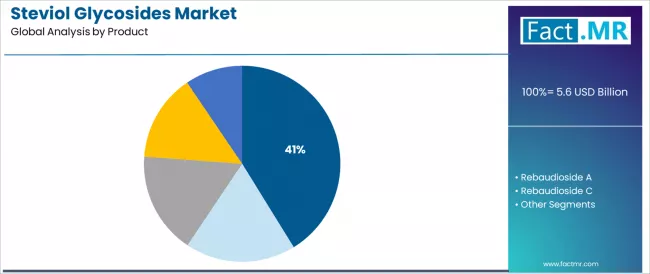
Market Position: Stevioside commands the leading position in the steviol glycosides market with a 41.2% market share through superior cost-effectiveness characteristics, including established extraction presence, extensive commercial availability, and proven sweetening pathways that enable food manufacturers to achieve predictable sugar reduction outcomes across varied product categories and diverse formulation demographics.
Value Drivers: The segment benefits from economic advantages through lower production costs, abundant raw material availability without supply constraints, and established extraction documentation enabling straightforward commercial implementation. Advanced purification technology enables purity optimization for taste improvement, crystallization variation for application flexibility, and blending customization for bitterness masking, where sweetness intensity and cost efficiency represent critical formulation requirements. Stevioside extracts with 95% purity hold significant share within the product segment, appealing to manufacturers seeking economical natural sweetening capabilities for mass-market products.
Competitive Advantages: Stevioside products differentiate through proven cost-effectiveness profiles, food industry familiarity advantages, and integration with established reformulation protocols that enhance sweetening confidence while maintaining economical product outcomes for diverse food applications.
Key market characteristics:
- Advanced sweetness potency properties with 200-300x sugar sweetness and reproducible performance for consistent formulation
- Superior cost documentation, enabling budget optimization and ingredient cost reduction readiness for food applications
- Comprehensive regulatory acceptance, including GRAS status and international food authority approval for global market applications
Why does Rebaudioside A Represent a Premium Taste Segment?
Rebaudioside A maintains substantial market position at 32.5% share through essential taste profile characteristics and reduced bitterness capabilities. These products appeal to beverage manufacturers and premium food producers seeking superior sensory quality with sugar-like taste delivery, offering clean sweetness patterns and minimal aftertaste approaches through high-purity extraction systems.
Market adoption is driven by beverage applications, emphasizing complete taste profile optimization and consumer acceptance progression through validated high-purity mechanisms.
How does Rebaudioside C Capture Strategic Market Share in Next-Generation Applications?
Market Context: Rebaudioside C demonstrates significant market position in the steviol glycosides sector with a 15.0% share due to emerging taste optimization requirements and established focus on advanced purification, superior taste profiles, and specialty formulations that maximize consumer acceptance while maintaining natural sweetening characteristics.
Appeal Factors: Food technologists prioritize Rebaudioside C for enhanced taste quality, comprehensive bitterness reduction, and integration with premium product development workflows that enables coordinated reformulation experiences across multiple product categories. The segment benefits from substantial taste improvement standardization and clean-label positioning campaigns that emphasize Rebaudioside C-based sweetening for premium natural applications.
Growth Drivers: Premium product expansion incorporates Rebaudioside C as preferred sweetening components for quality positioning programs, while taste-sensitive application development increases demand for superior-tasting systems with comprehensive consumer acceptance outcomes.
What drives Stevioside Adoption in Cost-Sensitive Applications?
Stevioside captures substantial product share through comprehensive requirements in mass-market food systems, budget-conscious formulation capabilities, and volume production optimization. These products demand cost-effective extraction protocols capable of achieving acceptable taste standards while providing consistent sweetening reliability and commercial scalability, appealing to manufacturers and formulation teams seeking evidence-based ingredient cost advantages beyond premium steviol glycosides approaches.
What establishes the Food Segment’s Leadership?
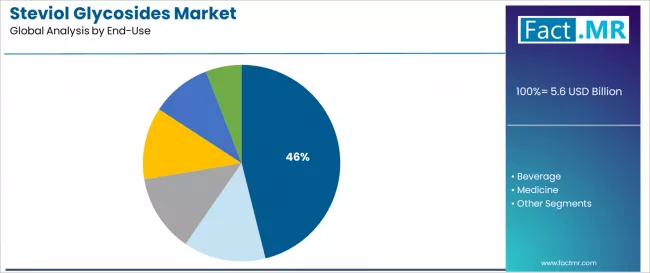
Market Context: Food demonstrates end-use leadership in the steviol glycosides market with a 46.1% share due to widespread sugar reduction requirements and established focus on bakery products, dairy formulations, and confectionery applications that maximize health positioning while maintaining appropriate taste standards.
Appeal Factors: Food manufacturers and product developers prioritize food applications for consumer health trends, comprehensive calorie reduction services, and integration with clean-label requirements that enables coordinated reformulation experiences across multiple product lines. The segment benefits from substantial obesity awareness and sugar reduction campaigns that emphasize food-based sweetening for critical health improvement applications.
Growth Drivers: Health food expansion incorporates steviol glycosides as essential ingredients for sugar-free positioning programs, while clean-label demand increases natural sweetener adoption that meets consumer expectations and ensures product differentiation capabilities.
End-use dynamics include:
- Strong growth in plant-based dairy requiring natural sweetening arrangements
- Increasing adoption in protein bars for taste enhancement positioning
- Rising integration with reduced-sugar bakery for health-conscious support
How are Beverage Applications Advancing Sugar Reduction Requirements?
Beverage captures substantial end-use share at 32.5% through established soft drink frameworks, complex carbonated beverage capabilities, and integrated functional drink protocols. The segment demonstrates specialized sweetening expertise across diverse beverage populations, with zero-sugar cola formulations and reduced-calorie juice drinks gaining traction in beverage programs while taste profile frameworks drive continued adoption requiring careful balance between sweetness delivery and flavor compatibility assurance.
What establishes Medicine's Strategic Position in Sugar-Free Formulations?
Medicine captures substantial end-use share at 12.0% through established pharmaceutical frameworks, complex syrup formulation capabilities, and integrated tablet coating protocols. The segment demonstrates specialized sweetening expertise across diverse pharmaceutical populations, with pediatric medicine formulations and diabetic-friendly products gaining traction in healthcare programs while regulatory compliance frameworks drive continued adoption requiring careful balance between taste masking and dosage form compatibility assurance.
What are the Drivers, Restraints, and Key Trends of the Steviol Glycosides Market?
| Category | Factor | Impact | Why It Matters |
|---|---|---|---|
| Driver | Rising health consciousness & sugar reduction trends (obesity concerns, diabetes prevention) | ★★★★★ | Consumer requirements enable steviol glycosides demand for calorie reduction validation; increasing health awareness drives natural sweetener adoption across food markets and diverse product segments. |
| Driver | Growth in clean-label movement & natural ingredient preferences (artificial sweetener avoidance, transparency demands) | ★★★★★ | Drives demand for plant-based sweetening systems and natural formulation protocols; manufacturers providing consistent taste outcomes gain competitive advantage in health-focused consumer segments. |
| Driver | Regulatory support & sugar tax implementation (government initiatives, reformulation mandates) | ★★★★☆ | Food companies demand approved natural alternatives and validated reduction systems; regulatory framework visibility expanding addressable segments beyond traditional diet product demographics and specialty food clientele. |
| Restraint | Taste challenges & aftertaste perception (bitterness concerns, licorice notes) | ★★★★☆ | Taste-sensitive consumers face acceptance limitations and product trial barriers, restricting adoption expansion and affecting market penetration in mainstream food categories and conventional beverage segments. |
| Restraint | High ingredient costs & price volatility (extraction expenses, agricultural variations) | ★★★☆☆ | Cost-conscious manufacturers face budget constraints and formulation limitations; increases ingredient barriers and affects adoption penetration in price-sensitive food segments and value product operations. |
| Trend | Advanced purification & taste optimization development (next-generation rebaudiosides, enzyme modification) | ★★★★★ | Growing industry preference for improved taste approaches and bitterness reduction beyond traditional stevioside extraction; purification technologies become core differentiation strategy for progressive ingredient positioning. |
| Trend | Functional food integration & wellness positioning (immunity support, gut health) | ★★★★☆ | Food industry evolving beyond simple sugar replacement toward functional benefit protocols; wellness positioning drives enhanced product value and health claim opportunities in sophisticated consumer environments. |
Analysis of the Steviol Glycosides Market by Key Countries
The steviol glycosides market demonstrates robust regional growth dynamics with emerging leaders including China (6.0% CAGR) and India (5.8% CAGR) driving expansion through stevia cultivation programs and natural sweetener production development. Strong performers encompass the USA (5.6% CAGR), Germany (4.7% CAGR), and Brazil (5.1% CAGR), benefiting from established clean-label food infrastructure and health-conscious consumer demographics. Developed markets feature Japan (4.9% CAGR) and South Africa (4.7% CAGR), where natural sweetener normalization and food reformulation expertise support consistent growth patterns.
Regional synthesis reveals Asian markets leading adoption through comprehensive agricultural capacity positioning and ingredient production expansion, while Western countries demonstrate strong growth potential supported by clean-label preferences and regulatory support influence. North American markets show solid development driven by health consciousness culture integration and sugar reduction infrastructure.
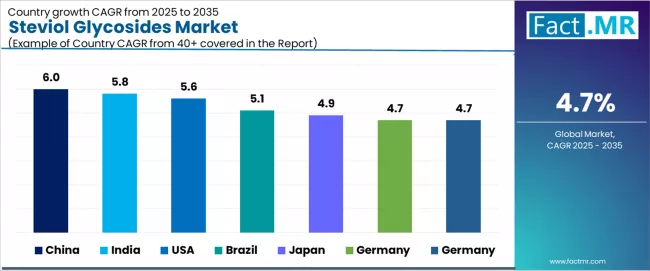
| Region/Country | 2025 to 2035 Growth | How to win | What to watch out |
|---|---|---|---|
| China | 6.0% | Focus on cultivation scale | Quality variations; export competition |
| India | 5.8% | Lead with agricultural programs | Infrastructure gaps; processing capacity |
| USA | 5.6% | Provide taste-optimized solutions | Market maturity; consumer preferences |
| Germany | 4.7% | Maintain quality positioning | Cost pressures; regulatory complexity |
| Brazil | 5.1% | Offer sustainable sourcing | Economic volatility; agricultural challenges |
| Japan | 4.9% | Deliver premium products | Conservative adoption; taste sensitivity |
| South Africa | 4.7% | Push regional expansion | Limited market size; distribution challenges |
China drives Fastest Market Growth
China establishes fastest market growth through progressive stevia cultivation expansion and comprehensive steviol glycosides production infrastructure development, positioning natural sweetener technologies as essential agricultural solutions in farming regions and emerging extraction facilities.
The country's 6.0% growth rate reflects rising agricultural investment levels supporting stevia cultivation and growing extraction capacity segments that encourage the deployment of steviol glycosides production in diverse manufacturing settings. Growth concentrates in major agricultural clusters, including Sichuan, Yunnan, and Jiangsu provinces, where cultivation facilities showcase increasing capacity for international quality standard adoption that appeal to export-focused producers demanding validated extraction processes and purity outcomes.
Chinese steviol glycosides producers are developing standardized extraction protocols that combine domestic agricultural production with advanced purification technologies, including contract farming expansion and quality control laboratory growth. Distribution channels through ingredient distributors and food additive suppliers expand market access, while agricultural training initiatives support adoption across diverse cultivation regions and processing specialization levels.
India emerges as an Agricultural Production Leader
In southern agricultural regions, Maharashtra farming zones, and Karnataka cultivation areas, stevia farmers and extraction facilities are adopting advanced steviol glycosides technologies as essential crop diversification tools for agricultural operations, driven by increasing domestic food industry demand and elevation of natural ingredient expectations that emphasize the importance of local sourcing.
The market holds a 5.8% growth rate, supported by agricultural development programs and food industry investment that promote steviol glycosides adoption for domestic consumption applications. Indian producers are favoring integrated cultivation platforms that provide comprehensive agricultural support and extraction efficiency evidence, particularly appealing in farming clusters where yield optimization and processing quality represent critical economic factors.
Market expansion benefits from substantial food industry growth and natural ingredient adoption that enable widespread use of domestically produced steviol glycosides methodologies for diverse food applications. Industry adoption follows patterns established in agricultural diversification programs, where crop profitability advantages and processing infrastructure drive farmer confidence and facility investment achievement.
USA shows Clean-Label Leadership
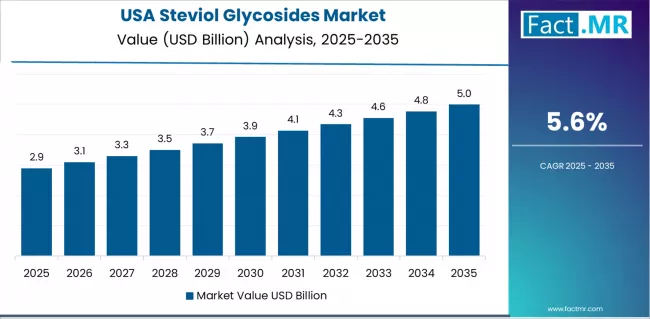
USA establishes clean-label leadership through comprehensive natural food movement and established consumer health consciousness, integrating steviol glycosides technologies across food manufacturers, beverage companies, and supplement producers. The country's 5.6% growth rate reflects mature clean-label framework presence and sophisticated sugar reduction levels that support widespread deployment of natural sweetener products in retail and food service applications.
Growth concentrates in established food regions, including California, the Midwest, and the Southeast, where manufacturers showcase advanced reformulation adoption that appeals to health-focused organizations seeking predictable taste outcomes and comprehensive natural positioning documentation.
American food manufacturers leverage established ingredient supplier relationships and comprehensive formulation expertise frameworks, including clean-label certification readiness and taste optimization programs that create sweetening confidence and consumer acceptance. The market benefits from substantial zero-sugar product development and health food expansion that encourage innovation investments while supporting steviol glycosides application advancement and taste improvement funding.
Germany shows Quality-Focused Integration
Germany's advanced food market demonstrates sophisticated steviol glycosides integration with documented quality emphasis in ingredient purity and application optimization through specialized food manufacturers and comprehensive beverage producers. The country maintains a 4.7% growth rate, leveraging rigorous quality standards and evidence-based formulation approaches in natural sweetening.
Premium food centers, including Bavaria, North Rhine-Westphalia, and Baden-Württemberg, showcase quality priorities where steviol glycosides technologies integrate with established food cultures and meticulous taste practices to optimize consumer acceptance and ensure product quality under stringent regulatory supervision.
German manufacturers prioritize ingredient validation requirements and comprehensive quality documentation in steviol glycosides implementation, creating demand for high-purity products with extensive characterization data, including taste profiling studies, stability testing, and comprehensive technical specifications. The market benefits from established organic food specialization and clean-label leadership that provide differentiation opportunities and compliance with strict German food regulations.
Brazil demonstrates Agricultural Sustainability
Brazil's developing food market demonstrates progressive steviol glycosides adoption with documented agricultural emphasis in sustainable cultivation and natural ingredient production through farming cooperatives and food processing companies. The country maintains a 5.1% growth rate, leveraging agricultural diversification initiatives and expanding food industry capacity in multiple regions.
Major agricultural centers, including São Paulo, Paraná, and Minas Gerais, showcase cultivation priorities where steviol glycosides technologies integrate with sustainable farming practices and growing domestic food demand to optimize agricultural economics and maintain environmental stewardship under comprehensive sustainability programs.
Brazilian producers prioritize sustainable sourcing strategies and cost-effective production in steviol glycosides program implementation, creating demand for agricultural support programs with proven cultivation characteristics, including technical assistance availability, contract farming arrangements, and market access guarantees. The market benefits from expanding natural food sectors and agricultural diversification opportunities that provide growth positioning and align with Brazilian agricultural development objectives.
Japan shows Premium Product Focus
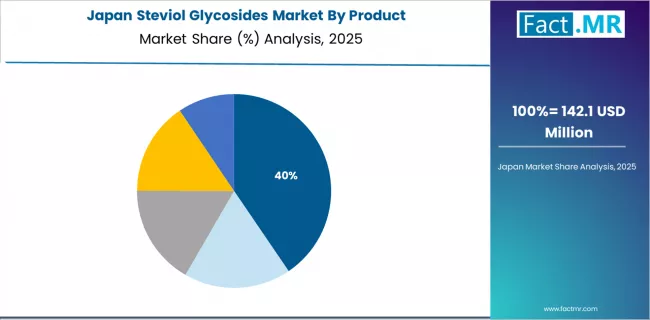
Japan's mature food market demonstrates established steviol glycosides integration with documented quality emphasis in taste optimization and consumer acceptance through premium food manufacturers and specialized beverage companies. The country maintains a 4.9% growth rate, leveraging established natural sweetener acceptance and sophisticated taste preferences in food consumption.
Key food regions, including Tokyo, Osaka, and Nagoya areas, showcase quality-driven formulation approaches where steviol glycosides technologies integrate with established food excellence cultures and meticulous taste evaluation to optimize product quality and maintain consumer satisfaction under rigorous quality supervision.
Japanese manufacturers prioritize comprehensive taste documentation and quality assurance systems in steviol glycosides program development, creating demand for premium products with extensive sensory validation, including taste panel testing, stability data, and comprehensive technical support. The market benefits from health food culture maturity and natural ingredient preference that provide premium positioning opportunities and maintain alignment with stringent Japanese food quality standards.
South Africa shows Regional Market Development
South Africa's developing food market demonstrates progressive steviol glycosides adoption with documented health emphasis in sugar reduction initiatives and natural sweetener awareness through urban food manufacturers and beverage companies. The country maintains a 4.7% growth rate, leveraging health consciousness expansion and food industry modernization in major cities.
Key food centers, including Johannesburg, Cape Town, and Durban regions, showcase reformulation priorities where steviol glycosides technologies integrate with growing health food sectors and improving natural ingredient awareness to optimize product positioning and maintain competitive differentiation under evolving consumer preferences.
South African manufacturers prioritize affordability solutions and practical implementation in steviol glycosides program development, creating demand for accessible products with proven performance characteristics, including local distribution availability, technical support programs, and application guidance. The market benefits from expanding middle-class health consciousness and food industry development that provide growth positioning opportunities and align with South African food innovation objectives.
Europe Market Split by Country
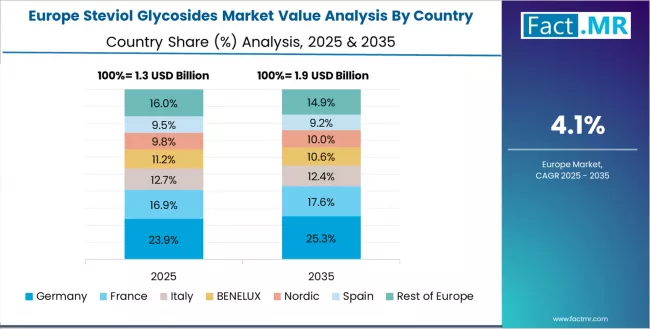
The European steviol glycosides market is projected to grow from USD 1.4 billion in 2025 to USD 2.1 billion by 2035, representing 25.0% of the global market in 2025 and expanding to 23.6% by 2035. Germany is expected to maintain its leadership position with USD 0.4 billion in 2025, accounting for 26.8% of the European market, supported by its advanced food manufacturing infrastructure and established clean-label product networks.
France follows with USD 0.3 billion, representing 18.9% of the European market in 2025, driven by comprehensive natural food integration and gourmet product concentration. UK holds USD 0.2 billion with 17.3% market share through established sugar reduction acceptance and food reformulation density.
Italy commands USD 0.2 billion representing 14.2% share, while Spain accounts for USD 0.2 billion or 11.6% in 2025. The rest of Europe region maintains USD 0.2 billion, representing 11.2% of the European market, attributed to increasing steviol glycosides adoption in Nordic countries and emerging Eastern European food sectors implementing reformulation programs.
Competitive Landscape of the Steviol Glycosides Market
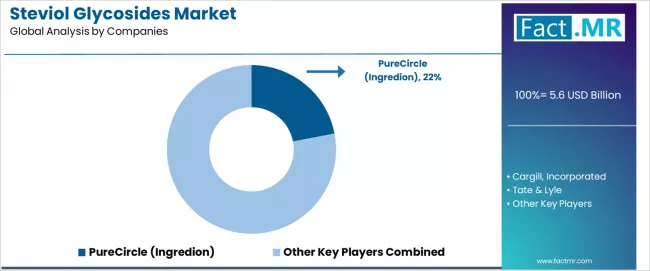
The steviol glycosides market exhibits a moderately consolidated competitive structure with approximately 40-60 active players operating across global food ingredient networks and regional natural sweetener distribution portfolios. PureCircle (Ingredion) maintains market leadership at a 22.0% share, reflecting strong product portfolio positioning across diverse steviol glycosides categories with sophisticated global food industry strategies.
This competitive landscape demonstrates the maturation of natural sweetener technology, where established players leverage agricultural sourcing advantages, extensive application expertise documentation, and food manufacturer relationship programs to maintain dominant positions, while emerging extraction technology developers and regional stevia processors create niche opportunities through specialized product offerings and competitive pricing strategies.
Market leadership is maintained through several critical competitive advantages extending beyond production capabilities and ingredient portfolios. Global sourcing networks enable leading players to navigate diverse agricultural requirements and access varied food segments including beverages, baked goods, and confectionery.
Technical support infrastructure and application development program availability represent crucial differentiators in steviol glycosides categories, where decades of formulation expertise, taste optimization protocols, and regulatory navigation frameworks create purchasing preference among quality-focused food organizations.
Production efficiency in extraction facilities, supply chain agricultural management, and purity consistency control separate major suppliers from smaller competitors, while comprehensive application documentation addressing taste profiling, stability studies, and regulatory compliance strengthen market position and manufacturer confidence.
The market demonstrates emerging differentiation opportunities in next-generation rebaudioside categories and enzymatic modification technologies, where traditional stevioside extraction methodologies face competition from innovation-focused entrants offering superior taste advantages.
Significant competitive advantages persist in established high-volume stevioside categories through comprehensive cost-effectiveness and agricultural sourcing depth. Premium positioning strategies with advanced purification technologies and specialty rebaudioside offerings command margin premiums through superior taste profiles and reduced bitterness.
Specialized sweetener portfolios combining multiple steviol glycosides types with application-specific blends create comprehensive positioning that justifies higher price points beyond commodity extract competition. Integrated solution offerings emphasizing complementary technical support, unified formulation assistance, and comprehensive regulatory guidance programs generate customer loyalty and ingredient preferences beyond transactional sweetener purchases.
| Stakeholder | What they actually control | Typical strengths | Typical blind spots |
|---|---|---|---|
| Global ingredient corporations | Comprehensive sweetener portfolios; global sourcing; application expertise | Scale advantages; technical capability; customer relationships; financial resources | Innovation speed; taste optimization; regional sourcing; specialty products |
| Specialized stevia companies | Extraction expertise; purification technology; agricultural partnerships | Product quality; technical sophistication; stevia focus; application knowledge | Diversification; geographic coverage; scale economics; price competitiveness |
| Regional processors | Local sourcing; cost optimization; regional distribution; agricultural proximity | Affordability positioning; supply security; market understanding; flexibility | Purification capability; brand recognition; international expansion; premium products |
| Agricultural cooperatives | Cultivation control; farmer relationships; raw material access; sustainability | Supply chain integration; traceability; cost advantages; local expertise | Extraction technology; purification capability; marketing resources; brand development |
| Technology innovators | Purification methods; taste optimization; enzyme modification; fermentation | Innovation leadership; taste improvement; IP portfolios; differentiation | Scale production; agricultural sourcing; distribution networks; market penetration |
Key Players in the Steviol Glycosides Market
- PureCircle (Ingredion)
- Cargill, Incorporated
- Tate & Lyle
- ADM (Archer Daniels Midland)
- GLG Life Tech Corp.
- HOWTIAN
- Evolva Holding SA
- Stevia First Corp.
- Sunwin Stevia International Inc.
- Kerry Group plc.
Scope of the Report
| Items | Values |
|---|---|
| Quantitative Units (2025) | USD 5.6 billion |
| Product | Stevioside, Rebaudioside A, Rebaudioside C, Dulcoside A, Others |
| End-Use | Food, Beverage, Medicine, Chemicals, Paints & Coatings, Personal Care |
| Regions Covered | North America, Europe, Asia Pacific, Latin America, Middle East & Africa |
| Countries Covered | USA, China, India, Germany, Japan, Brazil, South Africa, and 15+ additional countries |
| Key Companies Profiled | PureCircle (Ingredion), Cargill, Incorporated, Tate & Lyle, ADM, GLG Life Tech Corp., HOWTIAN, Evolva Holding SA, Stevia First Corp. |
| Additional Attributes | Dollar sales by product and end-use categories, regional adoption trends across North America, Europe, and Asia Pacific, competitive landscape with established ingredient corporations and specialized stevia companies, food manufacturer preferences for stevioside methodologies and cost-effectiveness, integration with food production facilities and beverage manufacturing organizations, innovations in purification technologies and taste optimization platforms, and development of sophisticated natural sweetening systems with enhanced taste profiles and comprehensive application frameworks. |
Steviol Glycosides Market by Segments
-
Product :
- Stevioside
- Rebaudioside A
- Rebaudioside C
- Dulcoside A
- Others
-
End-Use :
- Food
- Beverage
- Medicine
- Chemicals
- Paints & Coatings
- Personal Care
-
Region :
- North America
- USA
- Canada
- Mexico
- Europe
- Germany
- France
- UK
- Italy
- Spain
- Rest of Europe
- Asia Pacific
- China
- India
- Japan
- South Korea
- ASEAN
- Australia & New Zealand
- Rest of Asia Pacific
- Latin America
- Brazil
- Rest of Latin America
- Middle East & Africa
- GCC Countries
- South Africa
- Rest of Middle East & Africa
- North America
Table of Content
- Executive Summary
- Global Market Outlook
- Demand to side Trends
- Supply to side Trends
- Technology Roadmap Analysis
- Analysis and Recommendations
- Market Overview
- Market Coverage / Taxonomy
- Market Definition / Scope / Limitations
- Market Background
- Market Dynamics
- Drivers
- Restraints
- Opportunity
- Trends
- Scenario Forecast
- Demand in Optimistic Scenario
- Demand in Likely Scenario
- Demand in Conservative Scenario
- Opportunity Map Analysis
- Product Life Cycle Analysis
- Supply Chain Analysis
- Investment Feasibility Matrix
- Value Chain Analysis
- PESTLE and Porter’s Analysis
- Regulatory Landscape
- Regional Parent Market Outlook
- Production and Consumption Statistics
- Import and Export Statistics
- Market Dynamics
- Global Market Analysis 2020 to 2024 and Forecast, 2025 to 2035
- Historical Market Size Value (USD Million) Analysis, 2020 to 2024
- Current and Future Market Size Value (USD Million) Projections, 2025 to 2035
- Y to o to Y Growth Trend Analysis
- Absolute $ Opportunity Analysis
- Global Market Pricing Analysis 2020 to 2024 and Forecast 2025 to 2035
- Global Market Analysis 2020 to 2024 and Forecast 2025 to 2035, By Product
- Introduction / Key Findings
- Historical Market Size Value (USD Million) Analysis By Product, 2020 to 2024
- Current and Future Market Size Value (USD Million) Analysis and Forecast By Product, 2025 to 2035
- Stevioside
- Rebaudioside A
- Rebaudioside C
- Dulcoside A
- Others
- Y to o to Y Growth Trend Analysis By Product, 2020 to 2024
- Absolute $ Opportunity Analysis By Product, 2025 to 2035
- Global Market Analysis 2020 to 2024 and Forecast 2025 to 2035, By End-Use
- Introduction / Key Findings
- Historical Market Size Value (USD Million) Analysis By End-Use, 2020 to 2024
- Current and Future Market Size Value (USD Million) Analysis and Forecast By End-Use, 2025 to 2035
- Food
- Beverage
- Medicine
- Chemicals
- Paints & Coatings
- Personal Care
- Y to o to Y Growth Trend Analysis By End-Use, 2020 to 2024
- Absolute $ Opportunity Analysis By End-Use, 2025 to 2035
- Global Market Analysis 2020 to 2024 and Forecast 2025 to 2035, By Region
- Introduction
- Historical Market Size Value (USD Million) Analysis By Region, 2020 to 2024
- Current Market Size Value (USD Million) Analysis and Forecast By Region, 2025 to 2035
- North America
- Latin America
- Western Europe
- Eastern Europe
- East Asia
- South Asia and Pacific
- Middle East & Africa
- Market Attractiveness Analysis By Region
- North America Market Analysis 2020 to 2024 and Forecast 2025 to 2035, By Country
- Historical Market Size Value (USD Million) Trend Analysis By Market Taxonomy, 2020 to 2024
- Market Size Value (USD Million) Forecast By Market Taxonomy, 2025 to 2035
- By Country
- USA
- Canada
- Mexico
- By Product
- By End-Use
- By Country
- Market Attractiveness Analysis
- By Country
- By Product
- By End-Use
- Key Takeaways
- Latin America Market Analysis 2020 to 2024 and Forecast 2025 to 2035, By Country
- Historical Market Size Value (USD Million) Trend Analysis By Market Taxonomy, 2020 to 2024
- Market Size Value (USD Million) Forecast By Market Taxonomy, 2025 to 2035
- By Country
- Brazil
- Chile
- Rest of Latin America
- By Product
- By End-Use
- By Country
- Market Attractiveness Analysis
- By Country
- By Product
- By End-Use
- Key Takeaways
- Western Europe Market Analysis 2020 to 2024 and Forecast 2025 to 2035, By Country
- Historical Market Size Value (USD Million) Trend Analysis By Market Taxonomy, 2020 to 2024
- Market Size Value (USD Million) Forecast By Market Taxonomy, 2025 to 2035
- By Country
- Germany
- UK
- Italy
- Spain
- France
- Nordic
- BENELUX
- Rest of Western Europe
- By Product
- By End-Use
- By Country
- Market Attractiveness Analysis
- By Country
- By Product
- By End-Use
- Key Takeaways
- Eastern Europe Market Analysis 2020 to 2024 and Forecast 2025 to 2035, By Country
- Historical Market Size Value (USD Million) Trend Analysis By Market Taxonomy, 2020 to 2024
- Market Size Value (USD Million) Forecast By Market Taxonomy, 2025 to 2035
- By Country
- Russia
- Poland
- Hungary
- Balkan & Baltic
- Rest of Eastern Europe
- By Product
- By End-Use
- By Country
- Market Attractiveness Analysis
- By Country
- By Product
- By End-Use
- Key Takeaways
- East Asia Market Analysis 2020 to 2024 and Forecast 2025 to 2035, By Country
- Historical Market Size Value (USD Million) Trend Analysis By Market Taxonomy, 2020 to 2024
- Market Size Value (USD Million) Forecast By Market Taxonomy, 2025 to 2035
- By Country
- China
- Japan
- South Korea
- By Product
- By End-Use
- By Country
- Market Attractiveness Analysis
- By Country
- By Product
- By End-Use
- Key Takeaways
- South Asia and Pacific Market Analysis 2020 to 2024 and Forecast 2025 to 2035, By Country
- Historical Market Size Value (USD Million) Trend Analysis By Market Taxonomy, 2020 to 2024
- Market Size Value (USD Million) Forecast By Market Taxonomy, 2025 to 2035
- By Country
- India
- ASEAN
- Australia & New Zealand
- Rest of South Asia and Pacific
- By Product
- By End-Use
- By Country
- Market Attractiveness Analysis
- By Country
- By Product
- By End-Use
- Key Takeaways
- Middle East & Africa Market Analysis 2020 to 2024 and Forecast 2025 to 2035, By Country
- Historical Market Size Value (USD Million) Trend Analysis By Market Taxonomy, 2020 to 2024
- Market Size Value (USD Million) Forecast By Market Taxonomy, 2025 to 2035
- By Country
- Kingdom of Saudi Arabia
- Other GCC Countries
- Turkiye
- South Africa
- Other African Union
- Rest of Middle East & Africa
- By Product
- By End-Use
- By Country
- Market Attractiveness Analysis
- By Country
- By Product
- By End-Use
- Key Takeaways
- Key Countries Market Analysis
- USA
- Pricing Analysis
- Market Share Analysis, 2024
- By Product
- By End-Use
- Canada
- Pricing Analysis
- Market Share Analysis, 2024
- By Product
- By End-Use
- Mexico
- Pricing Analysis
- Market Share Analysis, 2024
- By Product
- By End-Use
- Brazil
- Pricing Analysis
- Market Share Analysis, 2024
- By Product
- By End-Use
- Chile
- Pricing Analysis
- Market Share Analysis, 2024
- By Product
- By End-Use
- Germany
- Pricing Analysis
- Market Share Analysis, 2024
- By Product
- By End-Use
- UK
- Pricing Analysis
- Market Share Analysis, 2024
- By Product
- By End-Use
- Italy
- Pricing Analysis
- Market Share Analysis, 2024
- By Product
- By End-Use
- Spain
- Pricing Analysis
- Market Share Analysis, 2024
- By Product
- By End-Use
- France
- Pricing Analysis
- Market Share Analysis, 2024
- By Product
- By End-Use
- India
- Pricing Analysis
- Market Share Analysis, 2024
- By Product
- By End-Use
- ASEAN
- Pricing Analysis
- Market Share Analysis, 2024
- By Product
- By End-Use
- Australia & New Zealand
- Pricing Analysis
- Market Share Analysis, 2024
- By Product
- By End-Use
- China
- Pricing Analysis
- Market Share Analysis, 2024
- By Product
- By End-Use
- Japan
- Pricing Analysis
- Market Share Analysis, 2024
- By Product
- By End-Use
- South Korea
- Pricing Analysis
- Market Share Analysis, 2024
- By Product
- By End-Use
- Russia
- Pricing Analysis
- Market Share Analysis, 2024
- By Product
- By End-Use
- Poland
- Pricing Analysis
- Market Share Analysis, 2024
- By Product
- By End-Use
- Hungary
- Pricing Analysis
- Market Share Analysis, 2024
- By Product
- By End-Use
- Kingdom of Saudi Arabia
- Pricing Analysis
- Market Share Analysis, 2024
- By Product
- By End-Use
- Turkiye
- Pricing Analysis
- Market Share Analysis, 2024
- By Product
- By End-Use
- South Africa
- Pricing Analysis
- Market Share Analysis, 2024
- By Product
- By End-Use
- USA
- Market Structure Analysis
- Competition Dashboard
- Competition Benchmarking
- Market Share Analysis of Top Players
- By Regional
- By Product
- By End-Use
- Competition Analysis
- Competition Deep Dive
- PureCircle (Ingredion)
- Overview
- Product Portfolio
- Profitability by Market Segments (Product/Age /Sales Channel/Region)
- Sales Footprint
- Strategy Overview
- Marketing Strategy
- Product Strategy
- Channel Strategy
- Cargill, Incorporated
- Tate & Lyle
- ADM (Archer Daniels Midland)
- GLG Life Tech Corp.
- HOWTIAN
- Evolva Holding SA
- Stevia First Corp.
- Sunwin Stevia International Inc.
- Kerry Group plc.
- PureCircle (Ingredion)
- Competition Deep Dive
- Assumptions & Acronyms Used
- Research Methodology
List Of Table
- Table 1: Global Market Value (USD Million) Forecast by Region, 2020 to 2035
- Table 2: Global Market Value (USD Million) Forecast by Product, 2020 to 2035
- Table 3: Global Market Value (USD Million) Forecast by End-Use, 2020 to 2035
- Table 4: North America Market Value (USD Million) Forecast by Country, 2020 to 2035
- Table 5: North America Market Value (USD Million) Forecast by Product, 2020 to 2035
- Table 6: North America Market Value (USD Million) Forecast by End-Use, 2020 to 2035
- Table 7: Latin America Market Value (USD Million) Forecast by Country, 2020 to 2035
- Table 8: Latin America Market Value (USD Million) Forecast by Product, 2020 to 2035
- Table 9: Latin America Market Value (USD Million) Forecast by End-Use, 2020 to 2035
- Table 10: Western Europe Market Value (USD Million) Forecast by Country, 2020 to 2035
- Table 11: Western Europe Market Value (USD Million) Forecast by Product, 2020 to 2035
- Table 12: Western Europe Market Value (USD Million) Forecast by End-Use, 2020 to 2035
- Table 13: Eastern Europe Market Value (USD Million) Forecast by Country, 2020 to 2035
- Table 14: Eastern Europe Market Value (USD Million) Forecast by Product, 2020 to 2035
- Table 15: Eastern Europe Market Value (USD Million) Forecast by End-Use, 2020 to 2035
- Table 16: East Asia Market Value (USD Million) Forecast by Country, 2020 to 2035
- Table 17: East Asia Market Value (USD Million) Forecast by Product, 2020 to 2035
- Table 18: East Asia Market Value (USD Million) Forecast by End-Use, 2020 to 2035
- Table 19: South Asia and Pacific Market Value (USD Million) Forecast by Country, 2020 to 2035
- Table 20: South Asia and Pacific Market Value (USD Million) Forecast by Product, 2020 to 2035
- Table 21: South Asia and Pacific Market Value (USD Million) Forecast by End-Use, 2020 to 2035
- Table 22: Middle East & Africa Market Value (USD Million) Forecast by Country, 2020 to 2035
- Table 23: Middle East & Africa Market Value (USD Million) Forecast by Product, 2020 to 2035
- Table 24: Middle East & Africa Market Value (USD Million) Forecast by End-Use, 2020 to 2035
List Of Figures
- Figure 1: Global Market Pricing Analysis
- Figure 2: Global Market Value (USD Million) Forecast 2020 to 2035
- Figure 3: Global Market Value Share and BPS Analysis by Product, 2025 and 2035
- Figure 4: Global Market Y to o to Y Growth Comparison by Product, 2025 to 2035
- Figure 5: Global Market Attractiveness Analysis by Product
- Figure 6: Global Market Value Share and BPS Analysis by End-Use, 2025 and 2035
- Figure 7: Global Market Y to o to Y Growth Comparison by End-Use, 2025 to 2035
- Figure 8: Global Market Attractiveness Analysis by End-Use
- Figure 9: Global Market Value (USD Million) Share and BPS Analysis by Region, 2025 and 2035
- Figure 10: Global Market Y to o to Y Growth Comparison by Region, 2025 to 2035
- Figure 11: Global Market Attractiveness Analysis by Region
- Figure 12: North America Market Incremental Dollar Opportunity, 2025 to 2035
- Figure 13: Latin America Market Incremental Dollar Opportunity, 2025 to 2035
- Figure 14: Western Europe Market Incremental Dollar Opportunity, 2025 to 2035
- Figure 15: Eastern Europe Market Incremental Dollar Opportunity, 2025 to 2035
- Figure 16: East Asia Market Incremental Dollar Opportunity, 2025 to 2035
- Figure 17: South Asia and Pacific Market Incremental Dollar Opportunity, 2025 to 2035
- Figure 18: Middle East & Africa Market Incremental Dollar Opportunity, 2025 to 2035
- Figure 19: North America Market Value Share and BPS Analysis by Country, 2025 and 2035
- Figure 20: North America Market Value Share and BPS Analysis by Product, 2025 and 2035
- Figure 21: North America Market Y to o to Y Growth Comparison by Product, 2025 to 2035
- Figure 22: North America Market Attractiveness Analysis by Product
- Figure 23: North America Market Value Share and BPS Analysis by End-Use, 2025 and 2035
- Figure 24: North America Market Y to o to Y Growth Comparison by End-Use, 2025 to 2035
- Figure 25: North America Market Attractiveness Analysis by End-Use
- Figure 26: Latin America Market Value Share and BPS Analysis by Country, 2025 and 2035
- Figure 27: Latin America Market Value Share and BPS Analysis by Product, 2025 and 2035
- Figure 28: Latin America Market Y to o to Y Growth Comparison by Product, 2025 to 2035
- Figure 29: Latin America Market Attractiveness Analysis by Product
- Figure 30: Latin America Market Value Share and BPS Analysis by End-Use, 2025 and 2035
- Figure 31: Latin America Market Y to o to Y Growth Comparison by End-Use, 2025 to 2035
- Figure 32: Latin America Market Attractiveness Analysis by End-Use
- Figure 33: Western Europe Market Value Share and BPS Analysis by Country, 2025 and 2035
- Figure 34: Western Europe Market Value Share and BPS Analysis by Product, 2025 and 2035
- Figure 35: Western Europe Market Y to o to Y Growth Comparison by Product, 2025 to 2035
- Figure 36: Western Europe Market Attractiveness Analysis by Product
- Figure 37: Western Europe Market Value Share and BPS Analysis by End-Use, 2025 and 2035
- Figure 38: Western Europe Market Y to o to Y Growth Comparison by End-Use, 2025 to 2035
- Figure 39: Western Europe Market Attractiveness Analysis by End-Use
- Figure 40: Eastern Europe Market Value Share and BPS Analysis by Country, 2025 and 2035
- Figure 41: Eastern Europe Market Value Share and BPS Analysis by Product, 2025 and 2035
- Figure 42: Eastern Europe Market Y to o to Y Growth Comparison by Product, 2025 to 2035
- Figure 43: Eastern Europe Market Attractiveness Analysis by Product
- Figure 44: Eastern Europe Market Value Share and BPS Analysis by End-Use, 2025 and 2035
- Figure 45: Eastern Europe Market Y to o to Y Growth Comparison by End-Use, 2025 to 2035
- Figure 46: Eastern Europe Market Attractiveness Analysis by End-Use
- Figure 47: East Asia Market Value Share and BPS Analysis by Country, 2025 and 2035
- Figure 48: East Asia Market Value Share and BPS Analysis by Product, 2025 and 2035
- Figure 49: East Asia Market Y to o to Y Growth Comparison by Product, 2025 to 2035
- Figure 50: East Asia Market Attractiveness Analysis by Product
- Figure 51: East Asia Market Value Share and BPS Analysis by End-Use, 2025 and 2035
- Figure 52: East Asia Market Y to o to Y Growth Comparison by End-Use, 2025 to 2035
- Figure 53: East Asia Market Attractiveness Analysis by End-Use
- Figure 54: South Asia and Pacific Market Value Share and BPS Analysis by Country, 2025 and 2035
- Figure 55: South Asia and Pacific Market Value Share and BPS Analysis by Product, 2025 and 2035
- Figure 56: South Asia and Pacific Market Y to o to Y Growth Comparison by Product, 2025 to 2035
- Figure 57: South Asia and Pacific Market Attractiveness Analysis by Product
- Figure 58: South Asia and Pacific Market Value Share and BPS Analysis by End-Use, 2025 and 2035
- Figure 59: South Asia and Pacific Market Y to o to Y Growth Comparison by End-Use, 2025 to 2035
- Figure 60: South Asia and Pacific Market Attractiveness Analysis by End-Use
- Figure 61: Middle East & Africa Market Value Share and BPS Analysis by Country, 2025 and 2035
- Figure 62: Middle East & Africa Market Value Share and BPS Analysis by Product, 2025 and 2035
- Figure 63: Middle East & Africa Market Y to o to Y Growth Comparison by Product, 2025 to 2035
- Figure 64: Middle East & Africa Market Attractiveness Analysis by Product
- Figure 65: Middle East & Africa Market Value Share and BPS Analysis by End-Use, 2025 and 2035
- Figure 66: Middle East & Africa Market Y to o to Y Growth Comparison by End-Use, 2025 to 2035
- Figure 67: Middle East & Africa Market Attractiveness Analysis by End-Use
- Figure 68: Global Market - Tier Structure Analysis
- Figure 69: Global Market - Company Share Analysis
- FAQs -
How big is the steviol glycosides market in 2025?
The global steviol glycosides market is estimated to be valued at USD 5.6 billion in 2025.
What will be the size of steviol glycosides market in 2035?
The market size for the steviol glycosides market is projected to reach USD 8.9 billion by 2035.
How much will be the steviol glycosides market growth between 2025 and 2035?
The steviol glycosides market is expected to grow at a 4.7% CAGR between 2025 and 2035.
What are the key product types in the steviol glycosides market?
The key product types in steviol glycosides market are stevioside, rebaudioside a, rebaudioside c, dulcoside a and others.
Which end-use segment to contribute significant share in the steviol glycosides market in 2025?
In terms of end-use, food segment to command 46.1% share in the steviol glycosides market in 2025.